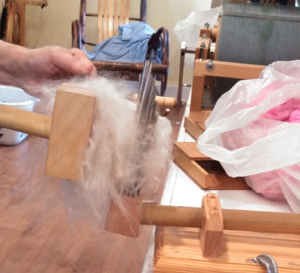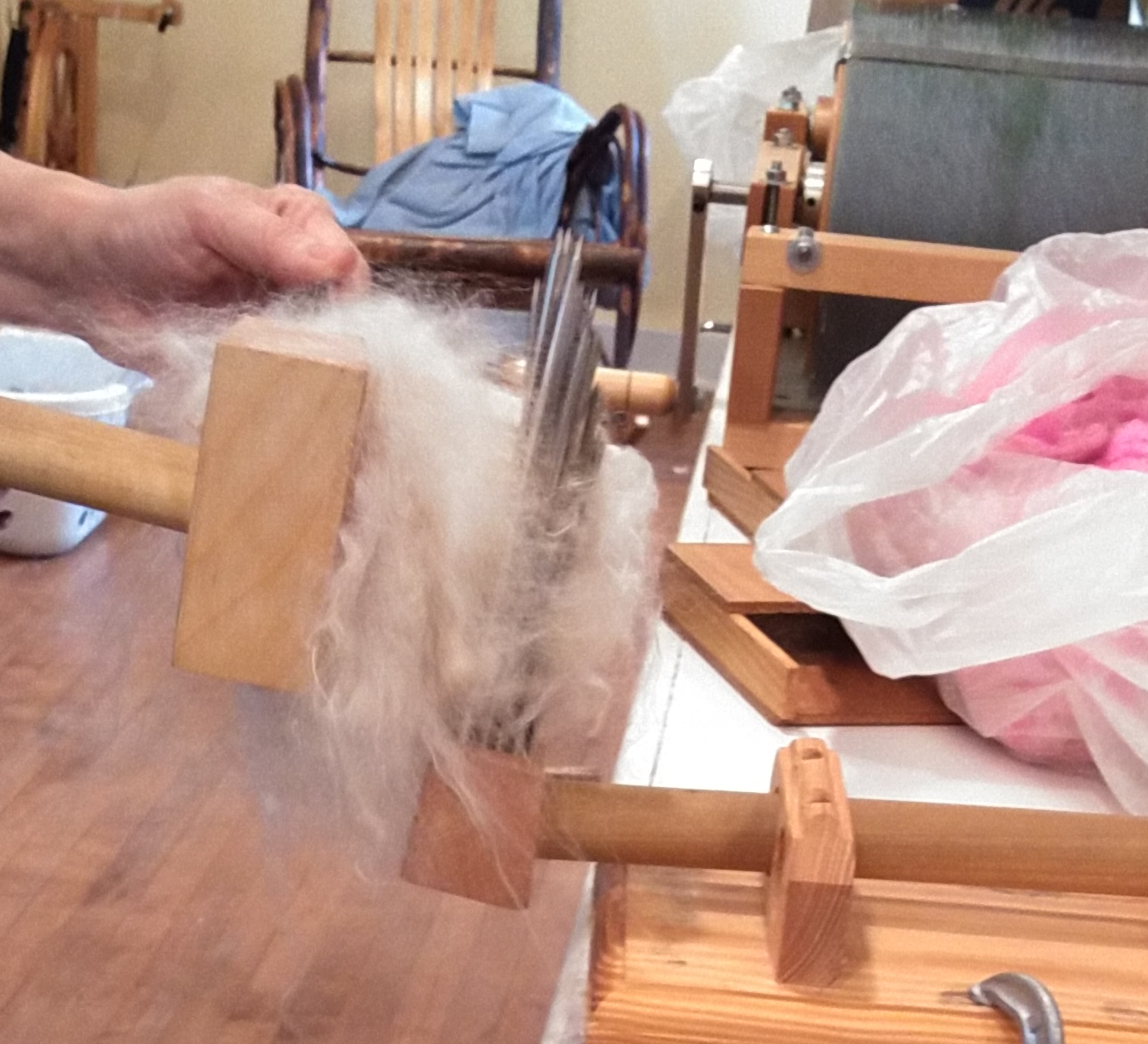I spin yarn. I’ve spun a lot of yarn. I’ve sheared alpacas, combed the down from dogs and rabbits, carded or combed whole fleeces to spin silk, sheep, angora goat, cotton, synthetic Tencel, llama, alpaca, four varieties of dog, and Angora rabbits on drop spindles and spinning wheels. I’ve spun fat yarn and fine yarn, knitted big, bulky ponchos and crocheted lace shawls. Along the way, I learned a very important lesson: the more junk I got rid of, and the more time I spent on it, the better the final product.
Spinning fiber is like the Christian life: the harvest is only the beginning of the story. Just as you’re never gonna get a sweater if you shear your sheep and toss the fleece in your barn, your faith is not going to do you, God, or anyone else any good if you accept Christ as your Savior and never consider Him again.
How else is spinning yarn like the Christian life?
Different fibers require different processing. However, every fiber has to be harvested. In the Christian life, that is the moment of salvation, when Jesus washes away our sins. Since we’re human, our fiber will not be harvested and cleaned at one go, so after harvesting, it must be cleaned. The cleaning will look different depending on the fiber. Animal fibers have to be skirted–have all the gross stuff that came in contact with the ground and hind ends removed–and thrown away. Silkworm cocoons have to be boiled and the worms and gum–thrown away. Cellulose fibers such as flax for linen have to have the stalks split and the non-fibrous parts–thrown away. Cotton has to have the seeds removed and the rest of the plant–thrown away.
The next step is more cleaning–picking out sticks from animal fiber, cleaning hard bits out of plant fiber–and throwing them away. If it is fiber from a sheep or goat, it must be scoured. Not washed. Scoured. The water will usually be so dirty you cannot see through it. Then, the water is thrown away. Otherwise, the grease and dirt will gunk up your tools. In the same way, all of us have to be cleaned by the Holy spirit; we just have different levels and kinds of garbage to throw away.
Next comes preparing the fibers. This is done by carding, combing, or hackling. Every one of these processes uses tools with terrifying teeth. I have scars all over my hands from getting snagged. Carding is the mildest. Tiny needle-sized wires are set in a rubber mat. The fibers are laid on the teeth and one card gently pulls the fiber off the other. You go back and forth at least twice; then you roll the smoothed fiber off the card to spin. Along the way, more bits of grass fall out of the fleece which you–throw away. Combing is more vicious. Two wooden handles with anywhere from one to five rows of NAILS sticking out of them are used.

The fleece is laid on one comb, the other pulls the fleece off. After switching back and forth a couple times, you pull the cleaned fiber through the teeth leaving behind a big wad of knots, grass fragments, and short bits (known as short cuts)–which you throw away. Are we sensing a pattern? Hackling is the scariest of all. A hackle is a tool with a series of nails sticking out of it. The first set of nails is large and set apart. The second set of nails is smaller and set closer together. The third set has the most and finest nails. A hackle is used for cellulose fibers. A bunch of plant material will be brushed across each set of teeth. Each set splits the fibers, which look like grass, into finer and finer strands, leaving behind a wad of short pieces called tow. In the old days, tow used to be used to chink log cabins, spin into rope, or burn–it would be thrown away. In the Christian life, we are confronted with challenges and difficulties. They have differing levels of difficulty, but usually the most challenging cause us to lose more of the garbage from our sinful natures and worldly influences. Their purpose is to get us to lean more on Jesus, share how He comforted us with others so they may be comforted, and be better witnesses for Christ as we become more like him.
Finally, we get to spin! Whenever I spin, I find more bits to pull out–little mats and short cuts that made it through the carding or combing. I always find a fine layer of dirt and ground up grass bits on the floor under my spinning wheel, which I sweep up and–you guessed it–throw away. Some projects require a bulky yarn, while some require a fine one. To get a fine laceweight yarn for a dressy shawl takes tremendously more time to spin than a bulky yarn for a big sweater. In the same way, the Christian life just takes time. If one minute of prayer will get you close to God, what will ten minutes do? If one Bible verse shows you His truth, nature, and will, what will one chapter show you? If one morning a week connects you to God’s people, what will adding a weekly Bible study do?
Which leads us to the final product. Before we can knit, weave, or crochet, we must wash the yarn to set the spin so it won’t unspin on us; there’s usually a lot of dirt in here, too, which we–throw away. The final product could be a felted rug to stand on while washing dishes. It could be the linen or cotton underwear that we still wear that used to be spun and woven by hand. It could be the silk and alpaca shawl I made for my daughter’s wedding veil. They each have their purpose. How well they function is going to depend on how well the yarn is made. Yarn that still has grass and seeds and thick, short, stiff fibers in it will not be comfortable. Yarn that was fudged on and not spun tightly enough will pull apart in the final product, as will yarn that still has short cuts in it; the smaller surface area will not allow other strands to hang onto them. Some of us as Christians are felted rugs to keep others safe and comfortable in the daily grind of life. Some of us are those base layers that no one sees but that are indispensable to daily functioning. Some of us come out on special occasions to reveal God’s beauty and glory. Like a good textile product, the more of our old, sinful, worldly self we discard, and the more time we spend with God, the more useful we will be for God’s kingdom, so we may one day hear Him say, “Well done, thou good and faithful servant.”
We also want this for our children, who have the advantage in life of having parents who are learning about growing in Christ first. Our discipleship of them is one of our most important tasks in life. Steve always told the kids that God has no grandchildren: every fleece is harvested individually: each person accepts Christ for himself. We have done daily devotions as a family since thirty-two year old Ben was only two. We read the Bible, memorized scripture, sang songs, attended church and Awana and family camps, served God in music, VBS, and Sunday School. Along the way, we prayed with them and for them to believe in Jesus, love Him, His Word, and His people, walk in purity, hear His voice and obey it. We are down to a fifteen year old and an eleven years old at home and we have a pretty good track record: nine out of ten have not gone over to the dark side. I would like to say we had a perfect ten out of ten, but it is a good lesson for us all: every child has to make his own decision for Christ. A perfect upbringing doesn’t guarantee a believing child. So we pray for child number ten to be harvested for the Lord while we continue to disciple our children of all ages, and grow ourselves to God’s final product.


Leave a Reply